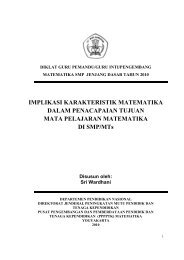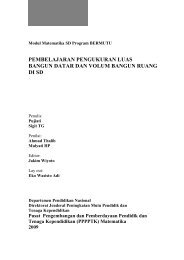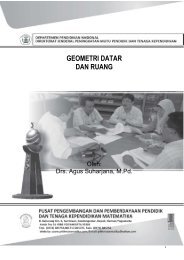25 Biggest Mistakes Teachers Make and How to Avoid Them
25 Biggest Mistakes Teachers Make and How to Avoid Them
25 Biggest Mistakes Teachers Make and How to Avoid Them
Create successful ePaper yourself
Turn your PDF publications into a flip-book with our unique Google optimized e-Paper software.
228 <strong>25</strong> <strong>Biggest</strong> <strong>Mistakes</strong> <strong>Teachers</strong> <strong>Make</strong> <strong>and</strong> <strong>How</strong> <strong>to</strong> <strong>Avoid</strong> <strong>Them</strong><br />
33.4. Was your behavior justified? If so, why?<br />
Absolutely not! You should never judge a student before he/she arrives.<br />
33.5. Do you regret your action(s)?<br />
Yes, I could have made a difference.<br />
33.6. Do you ever think about this incident? If yes, approximately how<br />
often since the occurrence(s)?<br />
Yes, several times.<br />
33.7. If faced with the same or a similar situation, what would you do?<br />
Not act like that. Be more open <strong>and</strong> nonjudgmental.<br />
Commentary<br />
The faculty lounge is the source of much gossip about students. Tea chers<br />
exchange student problems, form opinions, make judgments, develop expectations,<br />
<strong>and</strong> consequently ruin students’ chances for a clean slate <strong>and</strong> new, better<br />
behavior. To avoid prejudgment <strong>and</strong> unfair treatment, teachers can ignore<br />
faculty lounge gossip. They should welcome new students with the intent <strong>to</strong><br />
create a better learning environment for those students <strong>and</strong> help them succeed,<br />
even if they are labeled as troublemakers. Remember, in some cases, the child<br />
may be truly innocent of any wrongdoing <strong>and</strong> indeed, the teacher could be at<br />
fault. Such a case would warrant a fresh start for a child, free of bias.<br />
Teacher # 34<br />
A Scenario of a Teacher’s Worst Treatment of a Student<br />
It was my second class of 2000 <strong>and</strong> school house policy was no sleeping, or the appearance<br />
of sleeping. One male airman could just not stay awake in class. No matter how<br />
many times I had <strong>to</strong> tell him, he would just fall asleep. One day, I brought in a digital<br />
camera <strong>and</strong> when he fell asleep, I <strong>to</strong>ok some digital pictures, then downloaded them<br />
<strong>and</strong> displayed them in front of the whole class. The class was laughing hysterically,<br />
but he still did not awaken. At this point I was concerned so I scheduled him for an<br />
appointment at the Air Force medical center. It turns out he had sleep apnea.<br />
Motive Probe<br />
34.1. Describe the problem <strong>and</strong> your specific role in it.<br />
An airman was sleeping in class. My job was <strong>to</strong> keep him awake.<br />
34.2. Why did you do what you did?<br />
I wanted <strong>to</strong> make an example of him.





